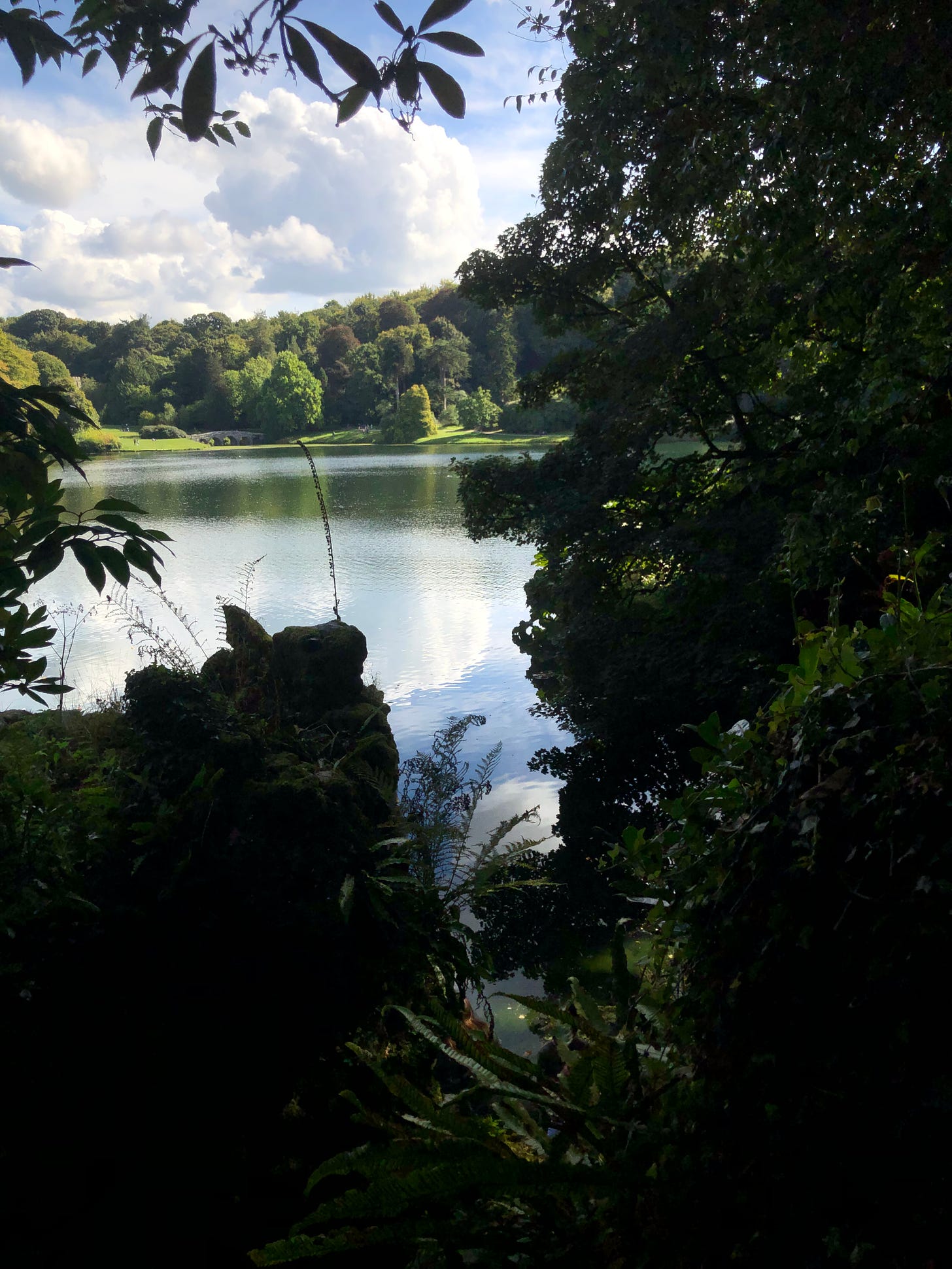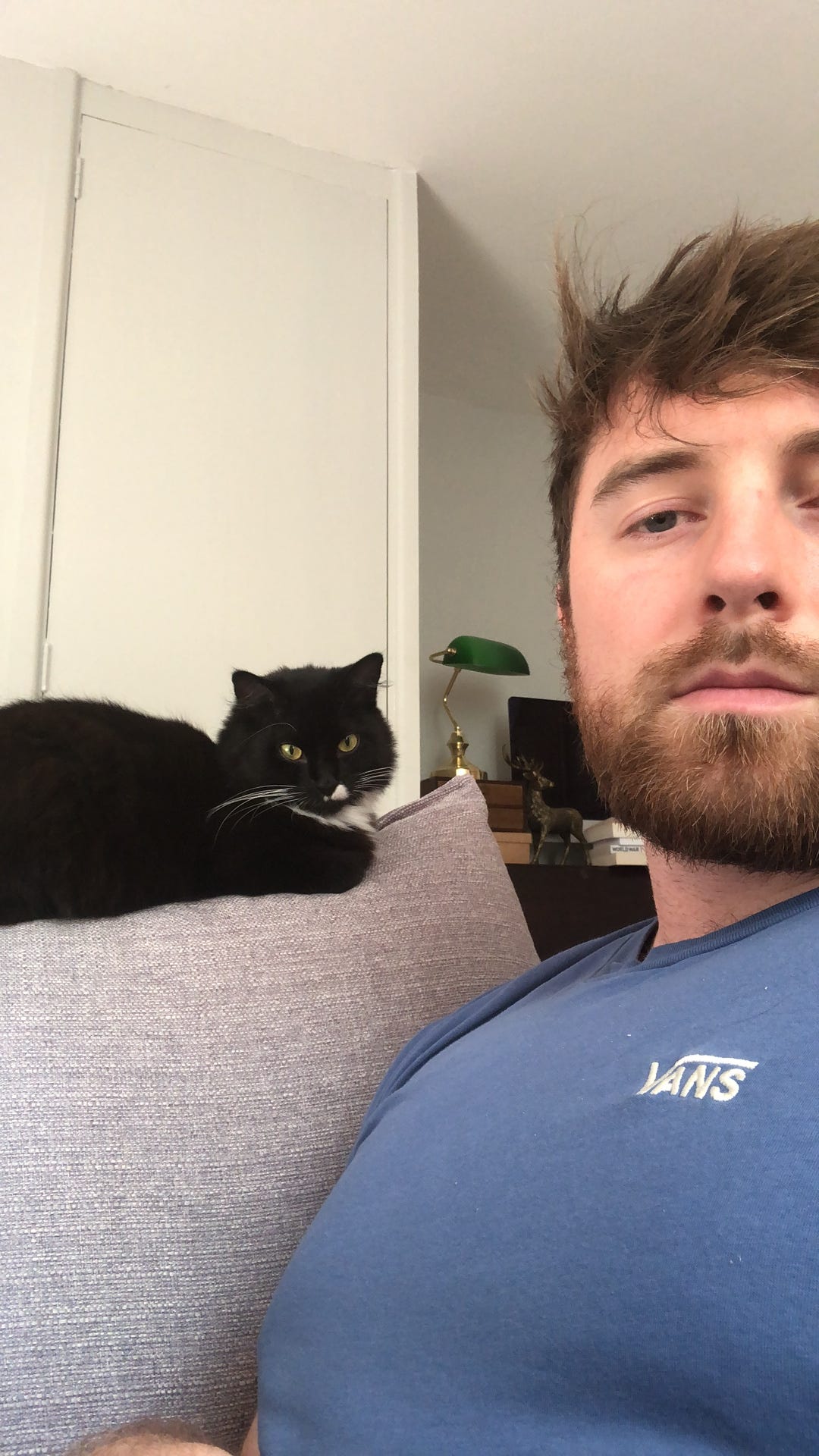I’ve recorded my first voiceover for this letter. ((Kind) feedback is both welcome & appreciated.)
Please support my writing. You can subscribe to this letter (for free or a few quid), leave a comment at the end, buy me a coffee, maybe a book, or hire me as a writer / comms consultant. (I’ve had loads of cool clients.)
Thank you!
.
Hello,
Here are ten things from the past week I’d like to remember.
one
‘Without selective interest, experience is an utter chaos.’
From How to Do Nothing by Jenny Odell (2019), which I finished today: a short, grounding series of essays on why & how to disengage with mindless engagement & subtle systems (here, the ‘attention economy’) that steal our finite time, giving very little back of what we actually need. Odell centres on the wish to ‘hold yourself still so that you can perceive what is actually there’ and to reengage with something else — something larger than just yourself. Community, or perhaps the biosphere you live in, that which is immediately, physically around you.
(I think it throws shade on similar systems discussed in Recovery by Russell Brand, which I’ve just started as an audiobook: ‘This is the age of addiction, a condition so epidemic, so all-encompassing & ubiquitous, that unless you are fortunate enough to be an extreme case, you probably don't know that you have it.’ It works through the 12-step programme for battling addiction, sans religion & in Brand’s brand of colourful, no-BS prose.)
two
On Odell’s point of being part of a valuable whole, this account of the archives of David Foster Wallace (who I’m yet to read) flung his novel The Pale King, quoted below (emphasis mine), onto my reading wishlist. (I originally wrote ‘the top’ of said list but, let’s admit it, I’m fickle.)
We’ve changed the way we think of ourselves as citizens. We don’t think of ourselves as citizens in the old sense of being small parts of something larger and infinitely more important to which we have serious responsibilities. We do still think of ourselves as citizens in the sense of being beneficiaries — we’re actually conscious of our rights as American citizens and the nation’s responsibilities to us and ensuring we get our share of the American pie. We think of ourselves now as eaters of the pie instead of makers of the pie. So who makes the pie?
& I suppose you could ask, riffing off Odell’s book, whether it’s a pie at all, and not just some hollow papier-mache, nutrient-free imitation of a pie, laced with addictive substances, right in front of an actual pie. (It’s nearly lunch here while I write this. Can you tell?)
Wallace makes a similar point here in a 2003 interview with ZDF: that our (he says ‘American’; I’d say capitalist?) direction in life, our charted course, is based on the satisfaction of one’s own needs, rather than anything collective or broader than ourselves. We’re not explicitly aware of it, he continues — after the sound guy interrupts his lucidity for a damned selfish battery change — it’s subtle. & what potential there could be, if only we were able to see how much more could be found if we didn’t always put our own desires first.
three
In a similar vein, World War Z (very nearly finished) comments on the zombies’ pure, base instinct: consume. They ‘showed no conscious thought’ other than that drive; my immediate thought upon hearing that was: how are we any different? Our species take & take & only think to give back once the thing is damaged.
What makes it worse? We’re conscious; we know what we’re doing.
But, there’s hope: while zombies are capable of ‘total war’, the drive to destroy & consume & nothing else, there will always be humans, good people, who question the necessity of destruction & the ways things are.
four
I’ve booked one of Mr B’s Reading Spas for December and started compiling a list of the reading / thought experiences I’m looking for. They were brilliant the first & last time I did it a few years back; that afternoon rooted my interest in culture as thereputic in its own right — so much of what’s used in therapy is metaphor, minute stories, as a means to better understanding our minds.
five
Speaking of which, here are some thoughts since finishing my final group behavioural activation therapy session on Friday.
Research: my ADHD, other CBT tools, philosophical & meditative practices, self-compassion, reflective Qs, family relationships.
Prioritise time for self-reflection: When planning my week, I’ll keep my Friday mornings free for whatever feels right: journalling, tarot cards / thoughts from loved ones for slightly askew reflections, more therapy if I think it could help / be affordable, walks with self-help audiobooks, etc.
Talk to someone wise: Some of the answers, and all of the action, for fixing our low and / or frantic moments sit with us. My own inner voice, hence noting ‘self compassion’ above, says well, what the hell do I know about helping myself if I’m in therapy?! But, in group sessions, I’d find myself answering my own Qs a lot of the time, out loud or otherwise, because I’d be spending that little bit of time thinking it through. One suggested tool to get over the criticism of self-advising was to imagine sitting with someone you consider to be very wise, somewhere peaceful, and talking things through with them, listening to the advice you imagine them giving. Real or fictional, it just needs to be someone you think would give sound advice — one of the practitioner’s suggestions, Stephen Fry, stuck for me, and I’ve come up with a few since then, too. (I personally think characters from films & series would work best: their image, mannerisms, and literal voice are instantly conjurable, but there are a lot of gaps there to fill with your own thoughts that may not exist with someone you know intimately.) I plan on printing a bunch of faces for little frames around my desk, like modern-day gods & saints to call upon.
Physical responses to physical responses: Anxiety is a fast heart, shallow breath, and nausea. Depression is exhaustion, a choked throat, and inhumanly long pauses. To have physical responses prepared, then, when physical reactions start to bloom, seems worth exploring: lavender oil, intense exercise, CBD, cuddling the cat — these are some of my own.
Stop striving for zero reaction: It’s not realistic, neurologically with my ADHD or perhaps even habitually depending how deeply engrained it is. Ways to self-soothe, longer-term reflective practices, and a keener eye on personal values will all help.
I share these in the hope it might help someone a bit, maybe even clearing a little space for you to be at peace long enough to create something wonderful.
six
One such value I’d like to explore, which I’ll include on the Book Spa list, will be sincerity. I’m interested in how characters grapple with the determination to live by self-set, perhaps not societally understood, values; I thought a lot this week about false selflessness, or attempts to be part of ‘something larger’ that were actually, deep down, about the individual (whether they were conscious of that or not), cheating themselves out of a genuine opportunity to be closer with the people they care about.
A question posed to me yesterday:
To support my loved ones, should I show my face at the funeral of an unpleasant family member?
I can understand both perspectives but, in reaction & after some thought, my answer remained: no. It feels, to me, like a token display of affection, far less important than consistent support: the tick-box of ‘turning up’ is irrelevant if the support starts & ends there. Sincere care is, surely, consistent connection.My relationship with the deceased is my own thing to consider, and I’ll light a candle, spare a thought, for them — in my own time. I’ll then continue to support the people around that person in a way that works for me & them.
It’s something I’d like to be better at, for sure, but this week’s reading & listening lent me the chance to be more aware of default ways of living &, most importantly, questioning them, for better or worse. (Book / film recommendations that look at this kind of conversation would be greatly appreciated; I’d like to explore it more.)
seven
I use an app called Instapaper.
It saves articles you want to read for some other time, offering the option (that I use every time) to speak — the robot lady reads it to me over a coffee, rather than having to spend more time looking at my phone’s screen.
Of course, if you don’t make the time to read them, it can build up fast. A couple of weeks ago, I’d managed to amass more than 200 articles.
This morning, after lots of deleting, archiving the favourites and, of course, reading, I finally got the number down to less than ten.
eight
One such article I’d saved months ago was a 45-minute read about the ‘ecological holocaust’ of wolves in Yellowstone National Park, and how political hatred can spread into the most obscure things.
To Marc Cooke, president of the nonprofit organization Wolves of the Rockies, the sentiment reflected in the image [of killing] a creature beloved by one’s political enemies is exactly what the events along Yellowstone’s boundary were all about. “You have an element that not only wants to kill that wolf, but takes pleasure in killing that wolf because it hurts and causes pain to the Yellowstone wolf-watching community,” he told me. “It’s a win-win for them. Not only did they get a Yellowstone wolf, they cause us pain and suffering.”
nine
The letter was no longer that & this for a couple of days.
The name made sense with the previous structure I tried; less so with this one. But, much like I’ve found with my tattoos, the original meaning may no longer apply but can be replaced with another, equally satisfying meaning. It’s still about listing creative things I enjoy, but also the ruminations that come from them, or sometimes separate from something altogether — how did they make this, what has it done to me. Those are the Qs I love.
So, the letter has, once again, returned to that & this.
ten
This coming week, I’ll
look through past issues to see what I’ve missed and actually plan it.
watch the full David Foster Wallace interview quoted above.
finish reading How to Do Nothing (Odell), The Woman in White (Collins), and maybe The Hunger Games (Collins); finish watching The Haunting of Bly Manor — and update my culture log with them all.
start studying A Swim in a Pond in the Rain by George Saunders and the stories it discusses; start scheduling MUBI time — and throw down everything else floating about in my head that ‘needs’ doing.
&
Thank you for reading! You can support my writing in a fair few ways — I’m grateful for them all. Subscribe here (for free or a few quid), leave a comment below, buy me a coffee, maybe a book, or work with me.




